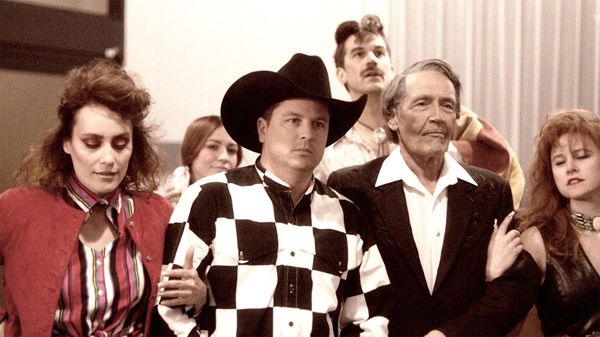 |
| Country Gold Photo: Courtesy of Fantasia International Film Festival |
When, back in 2022, Mickey Reece told me that he planned to make a film about country music, I didn’t expect to see it turn up at the Fantasia International Film Festival, but there’s something about Mickey’s work which just naturally fits in that space. Country Gold is a comedy, as usual, and it stars the director himself as young, up-and-coming Garth Brooks analogue Troyal, who is ambitious and pretty full of himself yet starstruck when he gets the opportunity to go to Nashville and spend an evening with one of his own country music heroes, George Jones (played by Mickey’s constant muse, Ben Hall). What he doesn’t know is that this is going to be George’s last night out for quite some time, as the ageing star is planning to get himself cryogenically frozen the following day. When Mickey and I reconnected at the festival, we began by talking about that latter idea, and I asked him where it came from.
“You know, I don't know,” he admits. “I remember we came up with this idea on the way back from Nashville in like, October [2019]. We premiered Climate Of The Hunter at a Fantastic Fest in Austin, then the very next month went to Nashville to play it, so on the way back, me and my friend Jake Snovel – he played the Terry Rothstein, Troyal’s manager, in Country Gold – we were talking about how funny it would be to do a Garth Brooks movie and, and yada yada and I don't really remember how the idea came about of George getting cryogenically frozen, but I think the whole idea was just kind of playing with that American iconography of these characters and who they are, but then ultimately making it kind of like fanfiction. You know what I mean? Where it's like it just a wild story, because if you think about it, even in an biopic where they're trying to be super accurate, there's no way they know what was said in the room. So in all the biopics, even the ones that are historically accurate, people are still creating, inventing those conversations that were had. So we just take it a step further and invent an entire scenario around it.”
 |
| Country Gold |
It’s inspired by a place which is somewhat fictionalised, too.
“You know, the way you see Nashville in movies and stuff is so far different than what Nashville actually is,” he says. “So I think I was more inspired by the Nashville from film, like Nashville the Robert Altman film. I like this cinematic idea of Nashville, more so than the actual Nashville.”
I tell him that I like the way he sets the scene for the initial meeting with shots in which we look up at brightly lit venue signs. It’s a very evocative, old fashioned technique. Was it related to the decision to shoot the film in black and white?
“It was always going to be in black and white, because it's a spiritual successor to the movie Mickey Reece's Alien, which is the Elvis movie we did. It’s not a sequel, just part of a trilogy, so it has to be in black and white because these ones are all going to be in black and white. So the aesthetic of it is just to recreate this iconic American mythology and have it depicted in this classic black and white. Where else are you going to see Garth Brooks in a Turner Classic Movies kind of setting? And then when we did the colour grade, what’s really fun is you've got a split screen where you're looking at the frame, and then the other frame was looking at The Last Picture Show. We were matching all of the dark, the blacks and the whites to make it exactly like The Last Picture Show.”
I explain that I saw the film with my partner, who is a cinematographer and was fascinated by the tonality in those images. How was it achieved?
“You know, on Climate Of The Hunter we had a two person camera crew. On Agnes, it was probably something like five or six, like a lot. A lot for us, not for most movies, but for us that was the grandest scale we’ve ever worked on. This one was kind of splitting the difference, so I think it was a matter of not having a lot of stuff to work with, but still having a little bit more to work with. I think you’ve got to get creative when that situation occurs. The monitor was in black and white, and we were lighting for black and white, so I think that has a lot to do with it, too.”
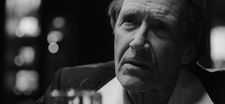 |
| Country Gold |
There's a great shot really close to the end where we move away from the spaces that we've been in, and look at the enormous building where George is going to go and get frozen. It looks like something out of a late 1940s or early 1950s science fiction movie. How did that shot come about?
“That place is in Oklahoma,” he says. “We looked at it and we looked at this other really cool place that was like a kind of dome. It was a church and it was just really strange, and that's the one we were going after, but those people were very strange and they did not want us going around there. So it's like, alright, we can't get permission to do this. So then we found that building, and my worry about that building was it looks too modern, you know, we still try to make it look like it's in the Nineties, but also by way of making it look like a classic, so it could be Nineties style or older. This one did not look like that, so we just shot it in a way where you don't ever actually see the whole building, you're just kind of seeing little snippets of it. If you saw the whole building, the illusion would be gone.”
I explain that I also like the shot because it feels as if George is going into the future, via the cryogenic process, whilst Troyal is going into the past, because he's started out as a guy who wants to be monogamous and teetotal, but he has relaxed some of his standards as he slips into old fashioned country star mode.
“Yeah, yeah, exactly,” says Mickey. “You know, it was so important for us to have that part at the end, you know what I mean? For there to be some kind of note, because normally, you’ve seen my movies, they don't have resolutions in that way. And so this one was, like, we've got to give these characters something where they can have a resolution at the end, but also make that relationship have heart in that way.
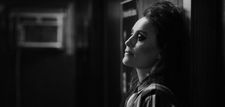 |
| Country Gold |
“We were shooting even on that day, like this, just looking at the monitor and blocking the scenes of George going into the building. You know, it was kind of emotional, but it was one of the last scenes we were filming too. So it's just like we went on this journey, which is great, and I hope that film depicts it like that. Audiences will like that, that it's just kind of like, ‘Alright, here's the resolution, and we're happy to see these characters go off and do their own thing.’”
And then there’s another layer of resolution because eventually they find some kind of understanding, after seeming very much at odds earlier on in the film. It’s interesting to think of it as fanfiction because Troyal seems very much like a lost fan early on.
“Yeah, yeah, exactly. And you know, that was a lot. So obviously, we didn't plan for me to play the role. It was just the other people that could resemble Garth Brooks, to do this, were so much bigger than Ben Hall would have been, eventually the producers just thought like, ‘You know, it'd be really very easy and very practical if you played the role.’ Especially because of Covid when we were trying to have limited people around. And then also, it would look right. They thought it would be very interesting to see our chemistry because we've worked so closely together as director and actor, so to see us act together. I was up for the challenge.”
It sounded fun, he says, especially as he and Ben are such close friends, and he thinks that the trust they share helped them to build chemistry onscreen. There was never anyone other than Ben in line for the role of George.
“Whatever movie I'm trying to make, I'm trying to write Ben a big role, because he makes it so easy for me.”
I ask if directing is a different experience for him when he’s also acting.
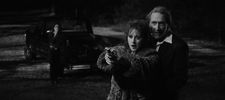 |
| Country Gold |
“There's some visual stuff that suffers because of it, and I hate that. Directing the actors is so much easier, because you're right there in the scene with them. You know what I mean? It's much easier to figure out where the scene is headed and what the direction of the scene is, because you're in it with them.
“I learned a lot from doing this. If I'm directing a big scene with a bunch of people, I noticed that it was a lot more organised for me to be in it. Let’s take the scene where they're all at the table and then the couple comes up, and she's taking the pictures. And then there's the other gentleman at the bar, and it's just a whole lot of moving parts going on in that scene. I think it was easier to pull off because I was in it with all of them, and I think it would have been a lot more chaotic if I was at the monitor just trying to direct each and every person. There was like a dynamic there that makes it different than that if I wasn't in the scene.”
There are some wonderful supporting performers in those roles. How did he find them?
“Well you know, basically, on this one, I just used all my friends. I know everybody in the cast. I just plucked people from different movies over the years that I thought would work in certain roles. This particular project was a locally funded movie, and a completely local cast. There was nothing that was not Oklahoma about this movie. So because of that, there was no casting director, there was no casting agent or anything. It's just like, ‘Oh, here's the script. Here are the roles. I’ve got to come up with this and then just make calls around town to to the people I've been working with through the years. And yeah, it was very, very easy to assemble.”
Early on, Troyal seems to be masking his uncertainties by performing as what he thinks he should be as a country performer. And there are very different notions of what that means, and what it means to be a successful performer or celebrity at play within the film.
“Of course, the idea from the get go is kind of ridiculous.” He shrugs and smiles. “But I’m not trying to make Step Brothers or something, you know what I mean? I'm not trying to make a really ridiculous slapstick comedy. So we always needed to create some weight in those characters and that seems like what those characters would be wrestling with: the idea of celebrity and the ego and stuff that that that comes with it. If we had to base anything on real characters, it seems like if Garth Brooks and George Jones got together. In that scenario, if this if this were actually real life, then I feel like that's something that they would be wrestling with – that George is kind of on the way out and Garth is on the way in. It just like seemed like in that dynamic, working out the dialogue between us, it just makes sense that's what would be weighing heavy on their minds.”
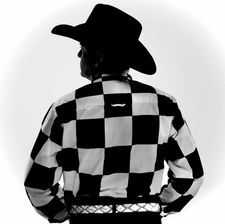 |
| Mickey Reece as Troyal in Country Gold |
And it's a film about country music, which doesn't have a great deal of country music in it. Was that a budgetary issue? Or was that just what made sense for the actual story?
“I love movies like Tender Mercies and Coal Miner's Daughter and Crazy Heart and stuff. I love this movie. I don't know if I'll ever make another country movie. But it's never about the music. That's never what fascinated me with those movies. It's just about the characters. So yeah, I wanted to, definitely. I couldn't afford a Garth Brooks song or a George Jones song, obviously – that's like the whole budget of the movie. But yeah, it was never about that. From the get go it was always just about using these characters in the story, it revolving around the music but not necessarily capitalising on or contributing to it.”
More the culture of it, I suggest.
“Yeah. The American mythology of at all.”
So how does he feel about having this one at Fantasia?
“Well, I'm glad!” he says. “I was worried because, you know, after doing three or four movies in a row, or three or four adjacent movies, Strike Dear Mistress and Climate Of The Hunter and Agnes, you know, I was kind of like, ‘Alright, I'm getting boxed in here.’ And I'm really not a horror director. I'm a comedy director. I like comedies. I like all kinds of movies, I like trying to play with all different genres. So it's kind of like, well, you know, this will be the one no one likes. So that Fantasia took it, I was like, ‘Great!’ Now let's see if people like it.”
He is, of course, already hard at work on his next film.
“The next movie is called The Cool Tinner,” he announces with a bit of a flourish. “Okay. Now, here's the premise. The logline. In a vaguely dystopian future, a retired widow weds an unstable jazz enthusiast who is obsessed over her late husband's death. It's really, really good. I'm really excited about it. So hopefully we'll get that going pretty soon.”





















